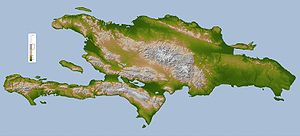
- Image via Wikipedia
On my blog, a woman named Mona pointed to Haitian corruption and declared: “I won’t send money because I know what will happen to it.” Another reader attributed Haiti’s poverty to “the low I.Q. of the 9 million people there,” and added: “It is all very sad and cannot be fixed.”
“Giving money to Haiti and other third-world countries is like throwing money in the toilet,” another commenter said. A fourth asserted: “Haiti is a money pit. Dumping billions of dollars into it has proven futile. … America is deeply in debt, and we can’t afford it.”
Not everyone is so frank, but the subtext of much of the discussion of Haiti is despair about both Haiti and foreign aid. Pat Robertson, the religious broadcaster, went furthest by suggesting that Haiti’s earthquake flowed from a pact with the devil more than two centuries ago. While it’s not for a journalist to nitpick a minister’s theological credentials, that implication of belated seismic revenge on Haitian children seems defamatory of God.
Americans have also responded with a huge outpouring of assistance, including more than $22 million raised by the Red Cross from text messages alone. But for those with doubts, let’s have a frank discussion of Haiti’s problems:
Why is Haiti so poor? Is it because Haitians are dimwitted or incapable of getting their act together?
Haiti isn’t impoverished because the devil got his due; it’s impoverished partly because of debts due. France imposed a huge debt that strangled Haiti. And when foreigners weren’t looting Haiti, its own rulers were.
The greatest predation was the deforestation of Haiti, so that only 2 percent of the country is forested today. Some trees have been — and continue to be — cut by local peasants, but many were destroyed either by foreigners or to pay off debts to foreigners. Last year, I drove across the island of Hispaniola, and it was surreal: You traverse what in places is a Haitian moonscape until you reach the border with the Dominican Republic — and jungle.
Without trees, Haiti lost its topsoil through erosion, crippling agriculture.
To visit Haiti is to know that its problem isn’t its people. They are its treasure — smart, industrious and hospitable — and Haitians tend to be successful in the United States (and everywhere but in Haiti).
Related articles by Zemanta
- Douglas Forbes: The Worst Kind of Suffering (huffingtonpost.com)
- Dominican Republic: Helping neighboring Haiti after earthquake (conversationsforabetterworld.com)
![Reblog this post [with Zemanta]](http://img.zemanta.com/reblog_b.png?x-id=7bf0a874-3f4c-4426-9693-9d4cb27fc1b8)








